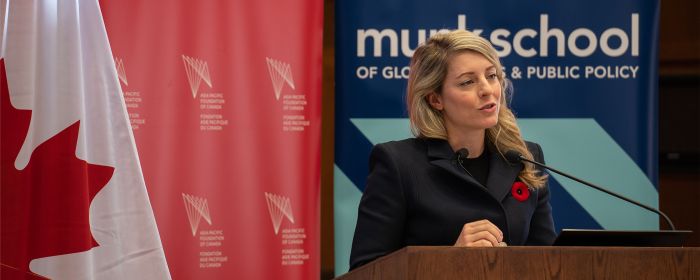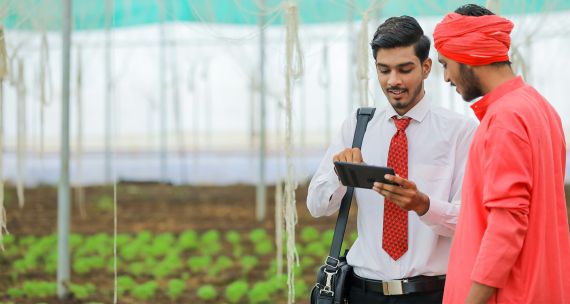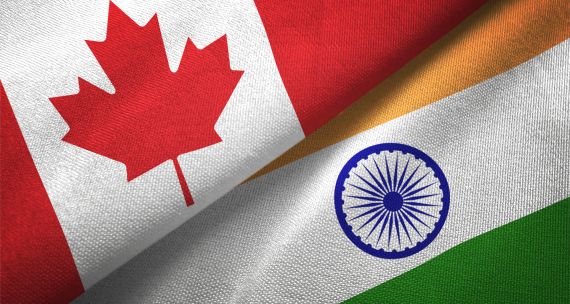On the eve of a 10-day trip to Asia to discuss Canada’s work to expand partnerships and deepen ties within the Indo-Pacific region, Canada's Minister of Foreign Affairs Mélanie Joly joined the Asia Pacific Foundation of Canada and the Munk School of Global Affairs & Public Policy for a co-hosted town hall event to discuss Canada's priorities in the region and the Government of Canada's forthcoming Indo-Pacific strategy.
In her wide-ranging speech and a candid Q&A session hosted by Munk School Director Dr. Peter Loewen on November 9, 2022, at the University of Toronto, Minister Joly expanded on Canada's new priorities and plans for renewed engagement in the Indo-Pacific region and provided a preview of Canada's forthcoming Indo-Pacific strategy, which will be released by the Government of Canada within a month.
Below, please find an encore video presentation of the November 9, 2022, event, along with the full transcript of Minister Joly's speech and moderated Q&A with Dr. Loewen. The Asia Pacific Foundation of Canada, like many Canadian organizations and institutions, eagerly awaits the release of Canada's new Indo-Pacific strategy and will be providing analysis and commentary as the government rolls out its ambitious new plan for this dynamic and growing region.
Watch the Encore Video
Read the Speech by the Hon. Mélanie Joly, Canada's Minister of Foreign Affairs, November 9, 2022
I'm really happy to be with all of you today in Toronto, speaking to you before I leave with the Prime Minister for the Indo-Pacific region. We will be participating in different summits in the region, particularly the ASEAN summit in Cambodia, the G20 Summit in Indonesia, and the Prime Minister will also attend the APEC Economic Leaders meeting in Thailand.
Expanding our partnerships with countries in this region and deepening our economic ties is critical. How we intend to do that will be laid out in our forthcoming Indo-Pacific strategy. I'm pleased to say that the . . . strategy will be launched within a month. Acting in Canada's national interest without compromising our values will be the central tenant. I look forward to discussing the details with you then, but for today, I would like to outline some of what we can expect.
Before we dive in, I know that we have all been following what is going on south of our border. I'd like to say that Canada's relationship with the United States has stood the test of time. We have a proven history of working together, no matter who holds the Congress, the Senate, or the White House. That tradition will carry on today. I'm grateful for the excellent relationship that I've been able to develop with my American counterpart, Tony Blinken, who is now, I would say, a friend who was just in Canada two weeks ago. The Secretary of State and I have frank and open discussions. By doing so, we've been able to further align our approaches on the issues that affect the health, the security, and the prosperity of citizens on both sides of the border. This includes on major geopolitical questions, the pandemic, Ukraine, of course, Iran, Haiti, and now the Indo-Pacific.
![ Hon. Mélanie Joly Canada's Foreign Affairs Minister [Click and drag to move] ](/sites/default/files/inline-images/Image%205_0.png)
We all know it, all of us feel it, we are at a critical moment in time. We may have been lulled into believing that the international system was more or less guaranteed as long as we stuck together . . . if we just held on, we could weather the storm. Yet, if there's one thing that 2022 has shown, it is that the tectonic plates of the world's power structures are moving. In this evolving global context, the status quo was not an option.
Canada ought to be clear about how we intend not just to engage, but to lead. To do so, we must deepen our existing friendship with Japan and South Korea, and we also need to seek new allies. We need to engage even when we disagree. We must show the world the very best of what Canada has to offer, diversify our diplomatic networks, and be a stronger force for positive change, showcasing Canada as a reliable partner for the region. This is what our Indo-Pacific strategy will be about.
The Indo-Pacific region is the epicentre of a generational global shift. It is the fastest-growing economic region of the world, responsible for almost two-thirds of global growth over the last several years. By 2030, it will be home to two-thirds of the global middle class, and by 2040, which is less than two decades from now, the region will account for more than half of the global economy, more than twice the share of the United States.
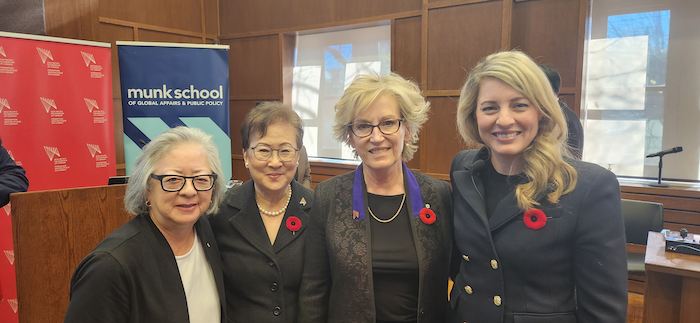
At the same time, greater power competition is deepening in the region. Interstate tensions, many with historical roots, are flaring or reemerging. Critically, the global fight against climate change cannot be one without the support of Indo-Pacific countries. Every issue that matters to Canadians – our national security, economic prosperity, democratic values, public health, the quality of our environment, the rights of women and girls, human rights – will be shaped by the relationship Canada and its partners have with Indo-Pacific countries.
To put it plainly, the decisions made in the region will impact Canadian lives for generations. We must be at the table, step up our game and increase our influence. I know the question on everyone's mind is how we will account for China, which sits at the heart of the region. Our approach to China will be outlined in the strategy for which, of course, we can't have an Indo-Pacific strategy without it. In 1970, Pierre Trudeau demonstrated international leadership by extending a hand to establish diplomatic relationships with China despite our different systems of government.
The reason was simple, and the rationale widely shared. The community of nations could not sustain [inaudible] then isolate one-fifth of humanity from its international institutions. Dialogue, as challenging as it was, had to prevail over ignorance and fear. While their strong people-to-people ties remain, the China of 1970 is not the China of today. China is an increasingly disruptive global power. It seeks to shape the global environment into one that is more permissive for interests and values that increasingly depart from ours. China's rise as a global actor is reshaping the strategic outlook of every state in the region, including Canada.
Canada will never apologize for its national interests, and we won't be sorry for seeking to uphold the global rules that govern trade, human rights, or navigation and over-flight rights. We will continue to engage at the highest levels regarding the human rights situation in the Xinjiang region in China, where credible accounts of human rights abuses and crimes against humanity are well documented. We will continue to oppose unilateral actions that threaten the status quo in the Taiwan Strait. We will deepen our economic ties with Taiwan. We'll continue to stand up for freedom of speech and freedom of the press in Hong Kong. And in multilateral forums, we will act in concert with partners to face the complex realities of China's impact on the world stage while pushing back against behaviours that undermine international norms.
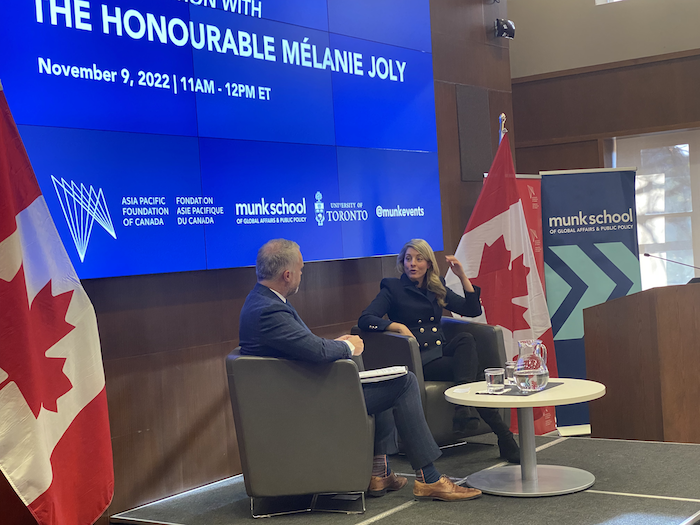
As we forge ahead with a strong, multidimensional approach to China, we'll always differentiate between the actions of the Chinese government and of the Chinese people. We will challenge China when we ought to, and we will co-operate with China when we must. Its sheer size and influence makes co-operation necessary to address the world’s existential pressure,s such as global health, nuclear non-proliferation, climate change, and biodiversity loss.
This is why Montreal, my hometown, will be hosting the world for the UN Conference on Biodiversity, COP15, this December under a Chinese presidency. With up to one million species currently at risk of extinction, the world cannot afford to wait any longer for [inaudible] action on nature protection. At all times, we will continue to have frank, open, and respectful dialogue. We'll not hold back from sharing our concerns, our principles, our positions, and our values.
What I would like to say to Canadians doing business in and with China, you need to be clear-eyed. The decisions you take as businesspeople are your own. As Canada's top diplomat, my job is to tell you that there are geopolitical risks linked to doing business with the country. We will, along with the Minister of Trade, my colleague and friend, Mary Ng, help you diversify and mitigate risks across the region.
We'll also be adding a new national economic security lens on foreign investments in Canada, including in the critical mineral sector, as highlighted by my colleagues, Minister of Industry François-Philippe Champagne and also my colleague, Minister of Natural Resources Jonathan Wilkinson. In the words of Lester B. Pearson, "How can there be peace without people understanding each other, and how can this be if they don't know each other?"
That is why I'm announcing today that we are investing in deepening our understanding of how China thinks, operates, and plans, how it exerts influence in the region and around the world. Key embassies across our network will have dedicated experts to deepen our understanding of the challenges that China poses and the opportunities that it pursues. That will become a focus of our diplomatic effort.
As we consider the rising influence of China, we must also take into account the remarkable trajectory of India, the world's largest democracy. As India becomes the most populous country in the world, its leadership and influence will only continue to grow, both in the region and globally. With it, so will the opportunity for Canada, including the economic opportunity for Canadian businesses. India is looking to expand its commercial relationships in the energy, food, and technology sectors, all areas of Canadian strength.
Canada and India also have deep and enduring people-to-people ties. Canadians with family connections to India and Indians who now call Canada home in richer communities, companies, cultural institutions, and this very campus. In fact, India is the largest global source of international students coming to Canada. We will look for new opportunities to invest in connecting our people, and we'll continue to build on our existing partnership to the benefit of citizens in both of our countries based on a commitment to democracy, human rights, common interests in the free, open, and inclusive Indo-Pacific, and collective efforts to address global challenges.
![ Hon. Mélanie Joly, Canada's Foreign Affairs Minister [Click and drag to move] ](/sites/default/files/inline-images/Image%202_0.png)
Both of these approaches when it comes to China and India will be outlined in the strategy document and found throughout what you will see are five objectives. The first objective commits Canada's promoting peace and security in the region and, in turn, the world. The second will focus on trade, investment, and supply chain resilience. The third one, we will invest in people, development, and the defence of human rights in the region.
We will also share our world-class expertise to support the fight against climate change. And finally, we will answer the call from partners for greater engagements by expanding our regional relationships.
If I go back to the first objective, the stability of the Indo-Pacific region is essential to global stability in general. As we are confronted with new threats at home, in the region, and in the digital sphere, our presence becomes all the more essential. We will do more to tackle foreign interference. We will increase our military presence and enhance our defence and security relationships with regional partners and allies.
We will continue to work hand-in-hand with ASEAN countries and, of course, its member states to ensure full respect for international law, including in the very important region of the South China Sea. As climate change redraws maritime routes and major countries look to the North, we'll continue to uphold our Arctic sovereignty and work with Arctic partners to ensure it is a region where peace and the rule of law prevail.
When going to the second objective now, which is trade, we know that in a world increasingly shaped by tension, trade is not only an economic driver but is also a geopolitical tool. We see this in emerging patterns of economic nationalism, protectionism, and economic coercion. Canadians are rightfully looking to the future and wondering whether good, middle-class jobs of the next generation, (what) these jobs will look like and whether they will have access to them.
Ensuring our economic system is stable and positioning Canada for long-term growth is in the interest of all Canadians. We have a comparative advantage. We are a member of the CPTPP, and we're the only G7 country with a free trade agreement with all other G7 countries. Earlier this month, I was pleased to announce our intention to join the Indo-Pacific Economic Framework, IPEF. A move that both the United States and Japan have stated their support.
I look forward to working with all of you in this room to seize the opportunities presented by the region, and let me tell you, the world is waiting for us. The strategy is not only about what the government can do; it's what we can do all together. Because it will take all of us. I'm a pragmatic. This is not a moment to isolate ourselves. Our diplomatic legacy is one Canadians can be proud of. One that we must build on to meet the challenges of today. To be a reliable partner for the future, we must stand with our allies. I would go even further: We need to broaden our coalition of states.
For us to succeed, it will take hard work, humility, and ambition. This moment demands a truly Canadian strategy. It demands the best of us, and Canada's best is its people. Thank you so much.
Enjoy the Moderated Q&A with Minister Mélanie Joly and Dr. Peter Loewen, Director of Munk School at the University of Toronto
Dr. Peter Loewen, Director of Munk School: Well, let me, first of all, say thank you very, very much for coming and joining us today.
Foreign Affairs Minister Mélanie Joly: It's a pleasure. And thank you for hosting us.
Peter: It's a wonderful audience to look out into. For those who want to ask questions, we're circulating cards, you can write them down and we'll get through as many of them as we can. We're also taking them online. Let's start with the name which you touched upon, which is in the news, and then we'll turn to the strategy. There was a report this week that CSIS has briefed the Prime Minister that there was Chinese interference in the 2019 election through money and assistance to candidates across the political spectrum. We know that this happens from more than one country. What should we be doing to make sure that our democracy is robust against foreign interference in democratic elections?
Minister Joly: Well, and I know everything linked to democracy is of interest to you, Peter. Well, listen, to be straightforward, we won't let any foreign actor meddle in our democracy, period. For the past two elections, we had a committee that was working on these very issues, and also, we strengthened our processes, but I think we need to do more. That's why I mentioned it in my speech, Peter, because indeed we need to make sure that we tackle foreign interference at home, but I would say, also, particularly in the digital sphere.
I've had many conversations with my colleagues around the world about this because this is a new challenge that we need to address per country, but also, we need to address together.
Peter: There's a lot of elements in the strategy. You've laid out five of them. We can go through them a little bit, but can you give us a sense of how the strategy you've articulated differentiates from what we're doing now? What's new?
Minister Joly: Well, many things. First, we will have a clear strategy rather than different initiatives. Right now, we are working with nine departments altogether to have a strong approach towards the Indo-Pacific. Because the problem Canada has been facing, and I see many of the consuls of different countries in the region, which they've been highlighting to me the issue of Canada not always being a reliable partner because sometimes we show up and then we leave and then we go back. That can be it.
What we're doing right now is a reorientation of our foreign policy towards Indo-Pacific. Of course, we'll continue to engage across the world, but this is extremely important, and since it is important, we want to make sure that it's a whole-of-government approach but more than that that it's a whole-of-society approach. In terms of what will be different, I'll be making different announcements, and my colleagues will be making different announcements linked to all the five pillars.
Peter: Just so we can peg it when we see it, what's an example of where we've been unreliable? Is it just a function of us not having enough diplomatic resources, or is it around trade agreements being? Where are our partners asking us to step up more?
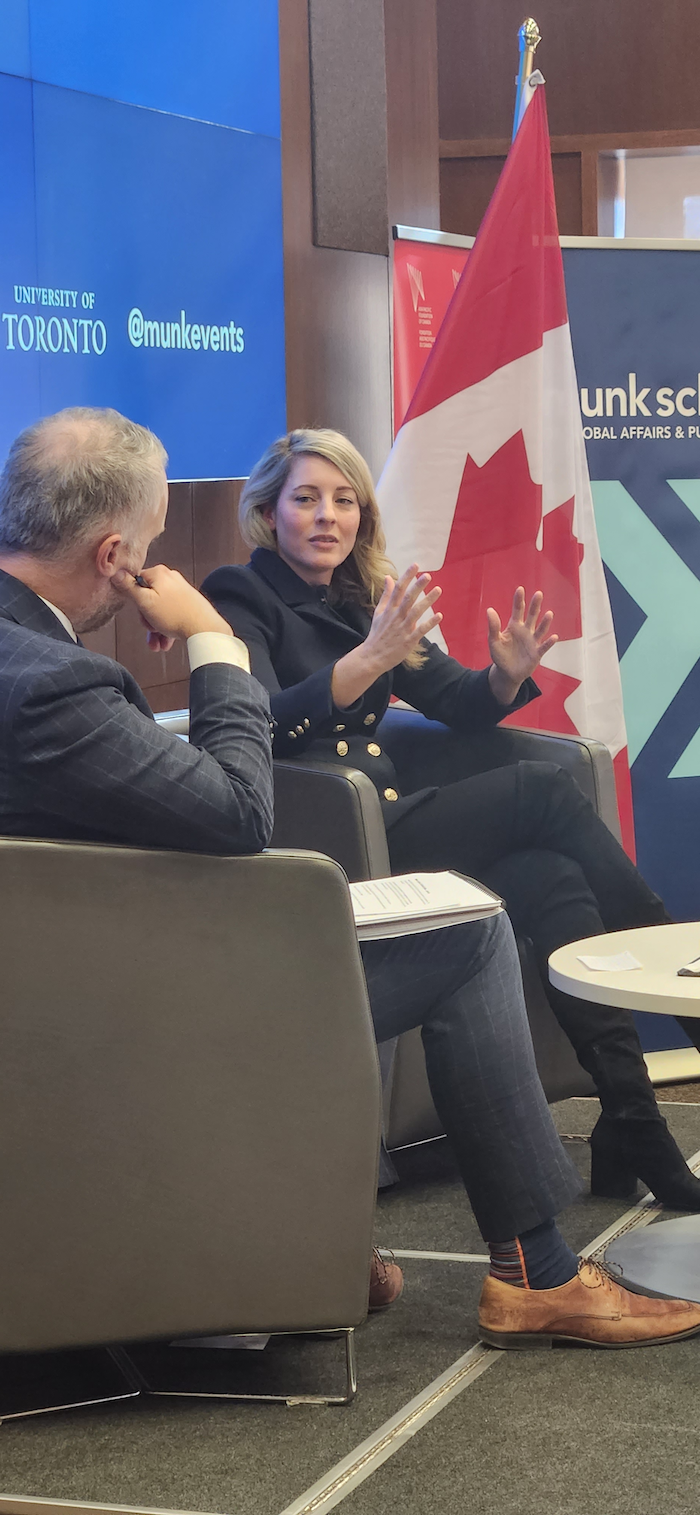
Minister Joly: I think that for a long time, we saw us as a very important transatlantic partner because we've invested a lot in the relationship with Europe. Obviously, we have a very important relationship with the U.S., and we work with them, obviously, throughout the continent and the hemisphere, and particularly also, the Arctic. But we need to set ourselves more as a Pacific nation. That is why the goal is to deepen the partnership in the Northern Pacific, definitely with Japan and Korea. And at the same time, we will continue to work with our Five Eyes allies, definitely Australia and New Zealand, and we want to make sure that we invest in the centrality of ASEAN and all the ASEAN countries. I'm looking forward to announcing the different strategy but also to sharing details of it in the Indo-Pacific when I'm there, starting tomorrow.
Peter: That's great. Let me ask you, and I think we're all really looking forward to the strategy being rolled out, it's been a long time that you've been pushing it and developing it in the department, and you've really drawn from across Canadian knowledge on this, which is wonderful engagement. Janice Stein always tells me that foreign politics in Canada is domestic politics, so there are two aspects to this, and I wanted to ask you about this. We have a very diverse country, obviously, and diasporic politics matter in our country. People care about the politics of the country which they're from. I'd just like to hear how you think about developing foreign policy, which, if we put it in colloquial terms, is going to be tougher on China than it has been. It's a different orientation towards India. What are the domestic challenges of executing a more robust foreign policy in this country against domestic politics?
Minister Joly: I think the fact that we have people from all around the world living in Canada, or that have roots to different parts of the world, is a strength. I think that people value in Canada our diversity. It was interesting to see the recent poll about the fact that Canadians support immigration, which is not the case in many countries in the world, I must say.
Obviously, we will be working with different communities. I think that they're at the core of the solution and that's why I say yes, it's all about the government investing, but it's also about all the people investing because at the end of the day, doing business with the region, with India, with ASEAN countries, happens because people trust each other and basically, they go into commercial agreements.
When it comes also to China, I think that we are having indeed a clear-eye approach, but there's a hundred billion dollars’ worth of trade with China. We know that. My job is basically to say that there is a geopolitical risk. Meanwhile, respecting the independence of the business sector, and engaging also with China on key issues. I profoundly believe in diplomacy. That's why I had many conversations with my counterpart Wang Yi, but we share concerns. We're not the only ones. Yes, the U.S. has shared concerns, but also Japan has shared concerns. The G7, European countries as well. Our goal right now is to really double down on the respect of international norms. This has kept the peace and stability since the Second World War . . . we will continue to work with other countries around the world to make sure that these norms are respected.
Peter: I want to follow up on this, and it's a question that shows up in the cards as well. You didn't talk too much about the power projection part of this. We talked about Taiwan a little bit, but something else that's happening in the region is the Quad that the United States, India, Japan, and Australia have teamed up in a sense and created a body where the four of them are working together. A little bit of this has to do with military procurement, but there's a military strategy there as well. What's the role of Canada's national defence in supporting foreign policy in the Indo-Pacific?
Minister Joly: Of course, I'll answer your question in two ways. There is indeed more mini-laterals that you're seeing. The Quad, AUKUS, et cetera. As I mentioned at the beginning, Canada was not always seen as a reliable partner, so that's why we decided to do this Indo-Pacific strategy. We joined the partners of the Blue Pacific, which was an initiative which was launched by the U.S. recently to support small island states in the Indo-Pacific. We just said that we would want to join the IPAC, so thank you again to Japan and thank you to the United States to supporting our bid. We hope that we can have the support of other countries represented by great people here tonight. At the same time, we will continue to engage even more to reinforce ASEAN, as definitely we will want to become a strategic partner of ASEAN.
When it comes to defence, I've already said that we would be increasing our investments in the defence and security sector. We've done really important work recently. I spent Thanksgiving in Busan, Korea on the HMSC Vancouver, who's an important ship that had just gone through an important patrol mission linked to the UN Security Council resolution on the DPRK, and at the same time, it had gone through the Taiwan Strait to uphold international norms relating to the Taiwan Strait. We have Operation Neon and Operation Projection in the region, but like I'm saying, our goal is actually to do more. And I'm working with the minister, but that's [inaudible] issue.
Peter: I want to ask you whether the Indo-Pacific strategy will articulate what domestic industries and resources we're willing to protect from foreign ownership and from control.
Minister Joly: Indeed, I mentioned in the speech that we will put a national economic lens on foreign investments. We've just announced that we would be doing so in the critical minerals sector. The Minister of Industry and the Minister of Natural Resources just announced that two weeks ago, and there will be other sectors. At the same time, we want to do it along with the business sector. We want to make sure that it makes sense, that we are able to showcase also that Canada is open to investment, but at the same time, we can't be naive.
Peter: Let's pursue this a little bit. Is that limited to Chinese purchases of critical minerals and resources? Or, BHP came along, or an Australian company, or an Indian company, would we similarly say we're holding onto those?
Minister Joly: The Minister of Industry will have more to say. What we said on the critical mineral side is that we would be tackling the issue of state-owned enterprises.
Peter: Let me ask a question that's been posed by Phil Lipscy, who's the Director of our Centre for the Study of Global Japan. Phil would like to know how you see Canada's relationship with leading democracies in the region, in particular, like Japan, South Korea and Taiwan? What are the key priorities for the strategy, especially with democratic partners?
Minister Joly: Well, I was in Japan and South Korea recently. It was a very successful trip. Japan will be hosting the G7 next year, so I will be there a lot, many of my colleagues will be there a lot, the Prime Minister will be there. I met with Prime Minister Kishida when I was in Japan, also. As for South Korea, President Yoon was in Canada, it was his first bilateral visit. Our goal is really to deepen our relationship with Japan and South Korea in particular.
Why? Because the Northern Pacific is our neighbourhood and we want to make sure that we invest in Japan and Korea, that we work together. Clearly, there's a lot of business to do between our countries, but also, we're like-minded, and it just makes sense to work together. I'll have more to say about this very important relationship, but trust me, I'll be going to this part of the world a lot. So please say that to your foreign ministers, because they will be caught seeing me a lot.
Peter: I don't know about this, but I'm not sure we've ever had two more frequently flying foreign ministers or ministers of international trade than you and Minister Ng. You are everywhere. Let me ask you a follow-up question on this. There are at least two parts of the strategy that relate to democratization, the promotion of peace and prosperity. Can you imagine us pegging any of our trade agreements or other engagements to the democratic performance of our partners? India, for example, is an embattled democracy in some ways right now, it is working through some really tough issues domestically as a democracy. Are we going to link up how countries are doing on things we care about, like human rights and democratization, with our trade agreements?
Minister Joly: I think we've done, through the CPTPP, a lot of work to make sure that it would become a progressive deal. Like I mentioned, we're the only G7 country that has a trade deal with other G7 countries. But we want to broaden the coalition of states. I think more than ever, there is a battle for influence in the world. We need to engage even when we disagree, we need to have tough conversations. Meanwhile, we indeed need to make sure that we have strong trade relations. We're a trading nation. We're 39 million people, but we're one of the most important economies in the world. That also depends on how we engage and are able to trade.
I don't see this neither nor, I think we have to do both. When it comes to India, I've mentioned, yes, we have strong people-to-people ties, but at the same time, we need to address the question of human rights, and minority rights, and we will do so. I had conversation with my colleague Jaishankar on this very issue and I will be seeing him next week and we'll be talking about, yes, our Indo-Pacific strategy, our focus on India, which includes every single part of our relationship.
Peter: Talking about non-democracies in the region, because there are many we're going to be engaging with or we do engage with.
Minister Joly: Of course, we engage with countries with different systems of government around the world. That has been the strength over the years, and I think because there's more instability in the world, more than ever, we need to do that.
Peter: So, should our trade engagement with China depend on its respective human rights.
Minister Joly: On the question of China, I've told you it's been clearly highlighted. We need to engage at different levels, but China right now poses a geopolitical risk, and the business community needs to know it.
Peter: Let's talk about the multilateral framework that you're going into. Speaking of travel, you’ve got an incredible week coming up. ASEAN, APEC is happening, you're going to the Francophonie, which . . .
Minister Joly: In Indonesia . . .
Peter: . . . which has of course has an Asian tie-in as well. Actually, it's much bigger than that, in North Africa and all those things. What should Canada be doing differently than it's doing now or enhancing what it's doing now to better project our influence in multilateral institutions?
Minister Joly: I think our influence is great in multilateral forms. I think that's where we are extremely strong. That's where our allies and partners and different countries of the world respect us. The issue right now is we need to make sure that the international norms that underpin many of these international forums are respected. Because Canada not only has worked on these international norms, we've been the architects and sometimes the engineers of these norms. We've benefited a lot from these norms. But we're not the only country, Peter, that has benefitted from these norms. Many countries as well. I'm not saying these rules are perfect. We also need, always, to make sure that we work on them. But at the end of the day, this has kept us safe since the Second World War. And as greater power competitioning is deepening, is increasing, well, we need to engage, we need to show up, we need to open doors. I'm not into door closing, I must say, I'm into opening doors.
Peter: Let me shift gears just a little bit. . . what should universities be doing to enhance Canadians' understanding of Asia, and of China, and what's the, here at U of T and TMU as well I'm sure, we care a lot about students coming to Canada, from China, from India. You touched upon this. What's the role of that kind of exchange at the level of universities? Is it going to be enhanced in your strategy? How should we be thinking about it? How do we manage, not the risks in it, but how do we manage making sure those relationships are very smooth? Two parts. Universities in general, and international students.
Minister Joly: When I say whole of government and whole of Canada, these are just not words. It's actually actions. What is also important for Canada's role in the world is the relationships that you all have, that we all have, with friends, and families, and counterparts in the world. More than ever, we need to engage not only at the diplomatic level, but I would say, all of the country. The goal is to make sure that yes, indeed, we deepen our relationship, and we deepen our knowledge on China.
Yes, we will be hiring new Canadian experts on China. I think there are different students in the room, so you know, but at the same time, we will be working to make sure that academics, many of you working here or at other universities, are participating in the development of that knowledge because we want to make sure also that we reinstitute this relationship between academics in Canada and academics in the rest of the world, which was underfunded and cut years ago.
My goal is to make sure that we use, not only our diplomatic power, because I really think we're a diplomatic powerhouse, but also our research power, our business power. You were talking about communities, our communities' power to reach out. This is really something that differentiates Canada from the rest of the world.
Peter: Let's follow up on diplomatic power because there's a certain school of thought in Ottawa that we actually need to really bolster our diplomatic core. You're talking about putting in Chinese-particular knowledge within embassies, but we actually need to renew global affairs and bring more people through it. Many of our students go through it, but that we need to get more people through the department. We need to project Canadian diplomatic power in more places. Do you see this as a resource challenge that we actually have more Canadian diplomats out there in the world, or is it something else? Every minister wants more for their department but what's your thought?
Minister Joly: Yes, of course. I always want more for my department, but at the same time, I think the strategy will give more to, not only the department, it's not about the department, it's about Canadians. It's about why we're doing things. It is about to make sure that we have the right tools to defend our national interests. Our national interests will be linked to the future of the region. It's just to make sure that we're smart about it. And, yes, indeed, Global Affairs needs to have well-resourced tools.
But the same time, like I was saying, we have to open the windows. We have to reach out. Diplomats can't work [inaudible]. They need to be able to have networks of intelligence across the board. That's why I said, I was talking about the communities and people, the business sector. Lots of countries in the world, Peter, are asking themselves, how do we modernize our diplomacy?
The world has changed in the way it is organizing itself, particularly in the digital sphere. China and other countries are testing multilateral forums. How can we make sure that we are really understanding what are the power dynamics happening within these multilateral forums? These are all questions that we are trying to solve through another piece of work that I'm working on which is called The Future of Diplomacy Within Global Affairs. I hope that the first report on this will be coming in the next month.
Peter: Let me ask you one more question if you would. This comes from the audience, and it says along with other G7 countries, Canada recently announced its participation in the PGII. This is often seen as a competing alternative to China's Belt and Road initiative. What's Canada's view on this?
Minister Joly: We're investing, like other G7 countries, in infrastructure in the region. We've announced it at the G7 Leaders Summit. We are working bilaterally with many of these countries. And I would say, also, our pension funds have done great work, which is not necessarily always highlighted, about being present in the region, particularly, I would, say India. When I talk about the business sector, I have in mind the pension funds. I have in mind also our banks. I have in mind many of powerhouses that are in Canada that can invest. At the same time, we will be in the strategy highlighting what will be the government tools to help them mitigate these risks and also make sure that countries in the region know where the resources and the funding are available because at the end of the day, countries in the region need to have access to choices, and that's what we will be able to provide.
Peter: If we look out five years from now, 10 years from now, this is successful. What does it look like for Canada? How are things different in how Canada sees itself and places itself in the world and how people are seeing us?
Minister Joly: I think it will be Japan and South Korea saying, "Well, yes, Canada has showed up and it is a reliable partner, and we have a trusted relationship." It will be ASEAN countries saying, "Canada's helping to keep the peace and stability in our region." It will be about Australia, New Zealand, saying of course, our friend, partner, brother, or sister, I don't know, “Canada is at the table.” And we're able to continue to ensure that there is economic prosperity for people in our country.
I didn't think, Peter, when I was appointed a year ago that the question of peace and stability would be as much as a focus of my mandate. I had this Indo-Pacific strategy to develop, and I decided to make sure that it would become a focus of not only Canada being a reliable partner in the region, but it would be a tool for us to make sure that, indeed, in five years, in 10 years, Canada will be that country that can help bridge divides and ensure that at the end of the day, the people living on this planet have access to a better living for the next years.
Peter: That's an inspiring vision. Please join me in thanking the minister.
Minister Joly: Thank you.
Christine Nakamura, APF Canada Vice-President, Central Canada Office: Minister, merci beaucoup. Thank you, Dr. Loewen. On behalf of the Asia Pacific Foundation of Canada, thank you very much for taking time out of your busy schedule to show up today. We have wonderful guests here with us and on behalf of Jeff Nankivell, our President and CEO, he is in Singapore right now, he just arrived last night and he's preparing for . . . our big Canada-in-Asia Conference that's going to take place in Singapore in February 2023. More to come on that. And again, many, many thanks. Merci beaucoup. Thank you very much and thank you Munk School of Global Affairs & Public Policy.
Main image courtesy of Jamie Napier, Munk School
This event was hosted in partnership by the Asia Pacific Foundation of Canada and Munk School of Global Affairs & Public Policy

